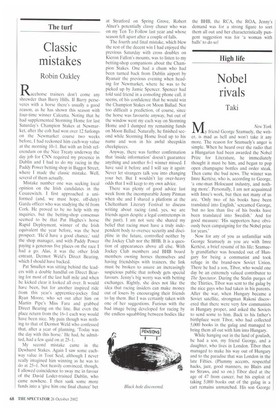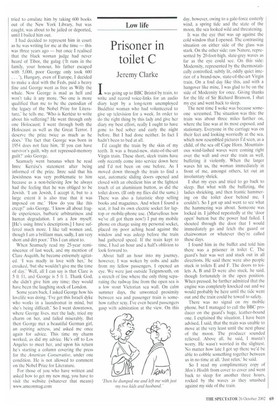High life
Nobel rivals
Taki
MNew York y friend George Szamuely, the writer, is mad as hell and won't take it any more. The reason for Szamuely's anger is simple. When he heard over the radio that a Hungarian had been awarded the Nobel Prize for Literature, he immediately thought it must be him, and began to pop open champagne bottles and order steak. Then came the bad news. The winner was Imre Kertesz, who is, according to George, 'a one-man Holocaust industry, and nothing more'. Personally, I am not acquainted with Imre's work, but then not many of us are. 'Only two of his books have been translated into English,' screamed George, tut no less than five of his books have been translated into Swedish.' And for good measure: 'His supporters have obviously been campaigning for the Nobel prize for years.'
Now for any of you as unfamiliar with George Szamuely as you are with Imre Kertesz, a brief resume of his life: Szamuely grandfather was hounded out of Hungary for being a communist and took refuge in the brand-new Soviet Union. There he had a son, Tibor, who would one day be an extremely valued contributor to The Spectator. During the Stalin purges of the Thirties, Tibor was sent to the gulag by the nice guys who had taken in his parents. After the war, when Hungary became a Soviet satellite, strongman Rakosi discovered that there were very few communists in Hungary proper, and asked the Soviets to send some to him. Back to his father's birthplace went Tibor, who had collected 5,000 books in the gulag and managed to bring them all out with him into Hungary.
While hanging out in the land of goulash, he had a son, my friend George, and a daughter, who lives in London. Tibor then managed to make his way out of Hungary and to the paradise that was London in the late Fifties. (Plummy accents, respectful hacks, jazz, good manners, no Blairs and no Straws, and so on.) Tibor died at the age of 47 from cancer, but his exploit of taking 5,000 books out of the gulag in a cart remains unmatched. His son George
tried to emulate him by taking 600 books out of the New York Library, hut was caught, was about to be jailed or deported, until I bailed him out.
I had decided to represent him in court as he was writing for me at the time — this was three years ago but once I realised that the black woman judge had never heard of Tibor, the gulag (`It runs in the family, your honour, his father escaped with 5,000. poor George only took 600 '), Hungary, even of Europe, I decided to make a deal with the Feds, paid a heavy fine and George went as free as Willy the whale. Now George is mad as hell and won't take it any more. 'No one is more qualified than me to be the custodian of the legacy of the Nobel Prize for Literature,' he tells me. 'Who is Kertesz to write about his suffering? He went through only one Holocaust: I went through both the Holocaust as well as the Great Terror, I deserve the prize twice as much as he does.' The fact that George was born in 1954 does not faze him. 'If you can have survivor's guilt, why not repressed-memory guilt?' asks George.
Szamuely went bananas when he read Imre Kertesz's statement after being informed of the prize. Imre said that his Jewishness was very problematic to him because as a non-believing Jew he always had the feeling that he was obliged to be Jewish. 'I am Jewish. I accept it, but to a large extent it is also true that it was imposed on me.' 'How do you like this creep?' asks George. 'I know all about fragile experiences, barbaric arbitrariness and human degradation. I am a Jew myself. [He's using Imre's descriptions.] I have suffered much more. I like tall women and, though I am a brilliant man, sadly, I am very short and dirt poor.' This I can attest to.
When Szamuely read my 25-year reminiscence of last week, and my mention of Clare Asquith, he became extremely agitated, 'I was madly in love with her,' he croaked, 'but she wouldn't give me the time of day.' Well, all I can say is that Clare is 5 ft 11, and George is 5 ft 1. Thank God, she didn't give him any time; they would have been the laughing stock of London.
Some years back, I asked George how his lovelife was doing. 'I've got this Israeli dyke who works in a laundromat in mind, but she's being difficult.' So I went downtown, where George lives, met the lady, tried my charm on her, and failed miserably. But then George met a beautiful German girl, an aspiring actress, and asked me once again for advice. This time my charm worked, as did my advice. He's off to Los Angeles to meet her, and upon his return he's starting a column covering the press for the American Conservative, under one condition. He is not allowed to comment on the Nobel Prize for Literature.
For those of you who have written and asked how to get my new mag, you have to visit the website (whatever that means) www.amconmag.corn



















































































 Previous page
Previous page